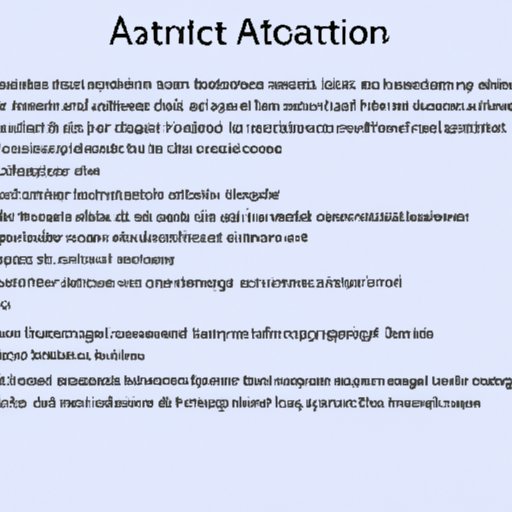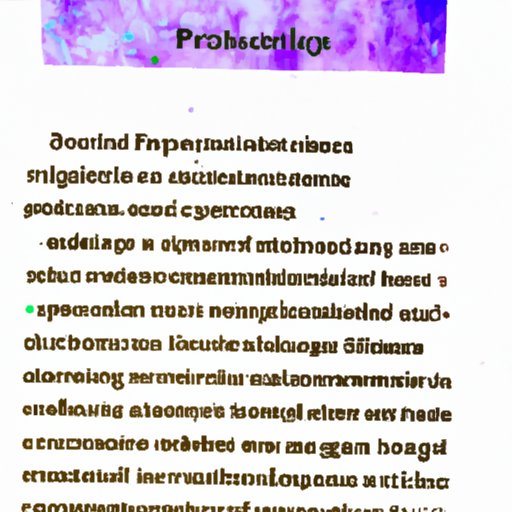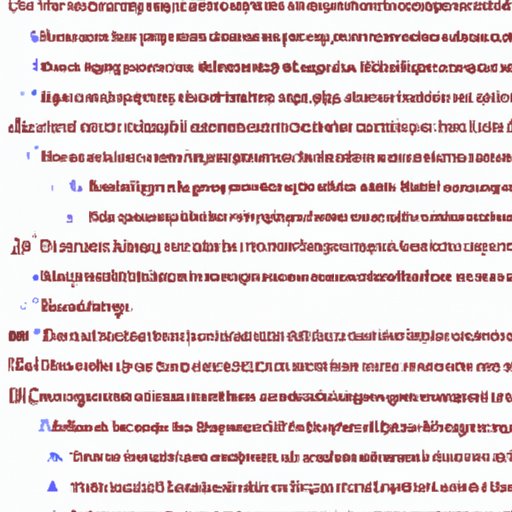Introduction
An abstract is an essential element of a science project. It provides a concise overview of the project’s purpose, results, and conclusions. To understand what an abstract means in a science project, it’s important to first define the term and consider its significance.

Overview of What an Abstract is and How to Write One for a Science Project
An abstract is a short summary of a larger work, such as a research paper or dissertation. Its purpose is to provide readers with a quick overview of the work without having to read the entire document. According to The American Heritage Dictionary, an abstract is “a brief, comprehensive summary of the contents of a document.”
The purpose of an abstract is to give readers a clear understanding of the project’s content and scope. An abstract should provide enough information to allow readers to decide whether they want to read the full document. It should also be succinct, so as not to take up too much space.
An abstract typically consists of four components: the purpose of the project, the methodology used, the results obtained, and the conclusions drawn from those results. The abstract should be written in the past tense and should include key words from the project’s title.
When writing an abstract for a science project, there are some important tips to keep in mind. First, make sure the abstract is clear and easy to understand. Second, provide only relevant information and avoid using jargon or technical language. Third, keep the abstract concise; it should be no more than 250 words. Finally, proofread the abstract carefully to ensure it is free of errors.

Crafting an Effective Abstract for a Science Project
Writing an effective abstract for a science project can be challenging, but it is essential for ensuring that readers understand the project’s purpose and findings. The process begins with creating an outline of the project. This will help you determine which information should be included in the abstract.
Once the outline is complete, it’s time to start writing the abstract. Begin by summarizing the purpose of the project, followed by a description of the methodology used and the results obtained. Finally, conclude with a brief statement of the conclusions drawn from the results.
After the abstract is written, it’s important to edit and revise it for clarity, accuracy, and conciseness. Make sure all the information included is relevant and that the language used is clear and easy to understand. Also, check for any spelling or grammar mistakes.
Tips for Writing an Engaging Abstract for a Science Project
Writing an engaging abstract for a science project requires careful attention to detail. Here are some tips for doing so:
- Use Clear Language: Avoid using technical terms or jargon. Instead, use simple, direct language that is easy to understand.
- Include Relevant Information: Make sure the information included in the abstract is relevant to the project and accurately reflects its purpose and results.
- Keep it Concise: An abstract should be no more than 250 words. Anything longer will likely be too long and difficult to read.

Using Abstracts to Summarize Science Projects
Summarizing science projects with an abstract can be beneficial for both researchers and readers. An abstract helps to quickly communicate the project’s main points, allowing readers to decide whether they want to read the full document. It also provides a useful reference point when citing the project in other works.
To write an effective abstract, it’s important to include relevant information and use clear language. Here are some examples of good abstracts:
- “This study aimed to investigate the effects of sleep deprivation on cognitive performance. Results showed that sleep deprivation had a significant negative effect on cognitive performance. These findings suggest that adequate sleep is necessary for optimal cognitive functioning.”
- “This study examined the relationship between physical activity and mental health. Results showed that higher levels of physical activity were associated with better mental health outcomes. These findings suggest that physical activity is an important factor in promoting mental health.”
When writing an abstract for a science project, it’s important to avoid common mistakes. For example, avoid making broad generalizations or introducing new information that was not discussed in the project. Additionally, avoid repeating information that has already been stated.
Conclusion
An abstract is an important part of a science project. It provides readers with a concise summary of the project’s purpose, results, and conclusions. When writing an abstract, it’s important to use clear language and include only relevant information. Additionally, make sure the abstract is concise and free of errors.
Summarizing the project with an abstract can be beneficial for both researchers and readers. An abstract allows readers to quickly understand the project’s main points and decide whether they want to read the full document. It also provides a useful reference point when citing the project in other works.
In conclusion, an abstract is an essential element of a science project. Knowing what an abstract is and how to write one can help ensure that your project is clearly communicated and well-received by readers.
(Note: Is this article not meeting your expectations? Do you have knowledge or insights to share? Unlock new opportunities and expand your reach by joining our authors team. Click Registration to join us and share your expertise with our readers.)
